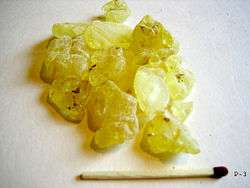Definify.com
Webster 1913 Edition
Mastic
Mas′tic
,Noun.
[F., fr. L.
mastiche
, mastichum
, Gr. [GREEK], fr. [GREEK] to chew, because of its being used in the East for chewing.] [Written also
mastich
.] 1.
(Bot.)
A low shrubby tree of the genus
Pistacia
(Pistacia Lentiscus
), growing upon the islands and coasts of the Mediterranean, and producing a valuable resin; – called also, mastic tree
. 2.
A resin exuding from the mastic tree, and obtained by incision. The best is in yellowish white, semitransparent tears, of a faint smell, and is used as an astringent and an aromatic, also as an ingredient in varnishes.
3.
A kind of cement composed of burnt clay, litharge, and linseed oil, used for plastering walls, etc.
Barbary mastic
(Bot.)
, the
– Pistachia Atlantica
. Peruvian mastic tree
(Bot.)
, a small tree (
– Schinus Molle
) with peppery red berries; – called also pepper tree
. West Indian mastic
(Bot.)
, a lofty tree (
Bursera gummifera
) full of gum resin in every part.Webster 1828 Edition
Mastic
MAS'TIC
Definition 2026
mastic
mastic
English

Mastic tears
Noun
mastic (plural mastics)
- An evergreen shrub or small tree, Pistacia lentiscus, native to the Mediterranean.
- 1745, Richard Pococke, A Description of the East, and Some other Countries, Volume II, Book I, Chapter 1,
- The island of Scio is now called by the Greeks Kio [Χιο], the antient Greek name of it was Chios [Χιος]; it was first called Ætalia in very antient times, and also Mastic, on account of the great number of mastic trees that were in this island.
- 1745, Richard Pococke, A Description of the East, and Some other Countries, Volume II, Book I, Chapter 1,
- A hard, brittle, aromatic and transparent resin produced by this tree and used to make varnishes and chewing gum, and as a flavouring.
- 1799, John Montagu, 4th Earl of Sandwich, Voyage Performed by the Late Earl of Sandwich Round the Mediterranean in the Years 1738 and 1739, Written by Himself, pp. 317-318,
- The mastic, of which the people of Scio gather every year an incredible quantity, is a very rich gum, made use of in medicines, which distils from a shrub called, in Latin, Lentiscus.
- 1830, Thomas Moore, Letters and Journals of Lord Byron: with Notices of his Life, New York: J. & J. Harper, Volume I, p. 402,
- Having taken upon me to order the repast, and knowing that Lord Byron, for the last two days, had done nothing towards sustenance, beyond eating a few biscuits and (to appease appetite) chewing mastic, I desired that we should have a good supply of, at least, two kinds of fish.
- 1834, James Augustus St. John, Egypt and Mohammed Ali, or Travels in the Valley of the Nile, London: Longman, Rees, Orme, Brown, Green & Longman, Volume I, Chapter 132, pp. 322-323,
- […] in many harems, the women are in the habit of burning mastic on a small chaffing-dish, and holding the mouth of the jars over the smoke; by which means they communicate to them a scent which perfumes the water for eight or ten days, at the expiration of which the operation must be repeated.
- 1799, John Montagu, 4th Earl of Sandwich, Voyage Performed by the Late Earl of Sandwich Round the Mediterranean in the Years 1738 and 1739, Written by Himself, pp. 317-318,
- An alcoholic liquor flavoured with this resin.
- 1913, Marjorie Bowen, A Knight of Spain, Part II, Chapter 6,
- He took a list from the desk and read aloud Fatima’s offerings:— […] four bottles of rare mastic from Scio.
- 1913, Marjorie Bowen, A Knight of Spain, Part II, Chapter 6,
- A flexible, waterproof cement used as an adhesive, sealant or filler.
- 1961, V. S. Naipaul, A House for Mr Biswas, Vintage International, 2001, Part One, Chapter 5,
- ‘They have a few holes here and there. A few. Tiny tiny.’ ‘We could fix those up easy. Mastic cement. Not expensive, boss.’
- 1961, V. S. Naipaul, A House for Mr Biswas, Vintage International, 2001, Part One, Chapter 5,
Translations
the shrub or tree Pistacia lentiscus
the tree's resin
the flexible, waterproof filler
See also
- Mastichochoria